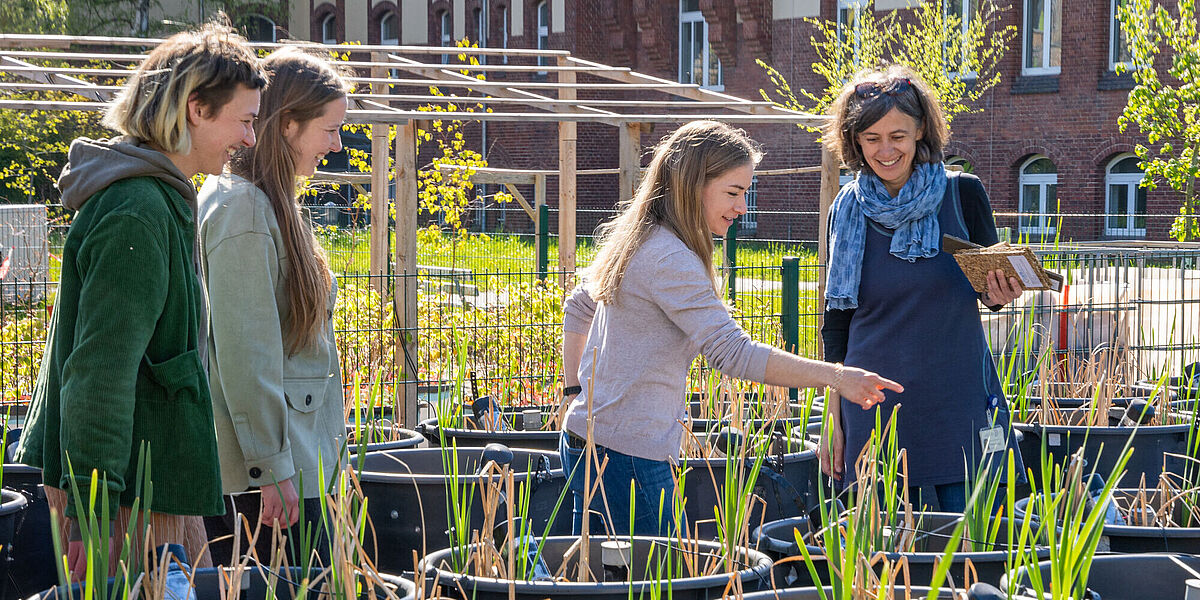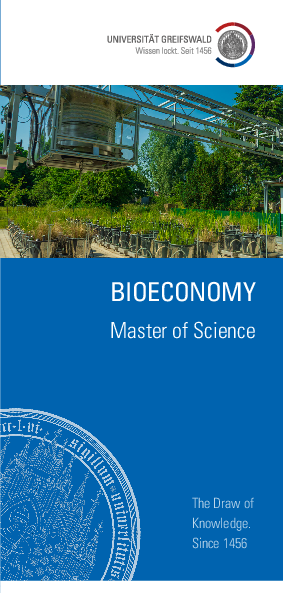You should bring the following skills with you
This study course is aimed mainly at graduates with a bachelor’s degree in a subject from the fields of biochemistry, biology, pharmacy, geography, business administration, economics, agriculture and forestry, or similar. Graduates from similar degree courses can also be granted admission from the examination board following an individual assessment (based on the Transcript of Records). Applicants require proven English language skills at level B2 of the ‘Common European Framework of Reference for Languages’ or alternatively, proof of at least seven years of English lessons at school. Study applicants require proof of German language skills at level DSH-2 or above, or equivalent. German language skills must be proven in accordance with the University of Greifswald’s DSH (Deutsche Sprachprüfung für den Hochschulzugang) examination regulations.
This subject is about
Bioeconomy is a cross-sector economic concept, which aims to shift the dominance of fossil raw materials to biogenic alternatives. By using innovative procedures, bioeconomy endeavours to increase the creation of value in local regions, as well as the amount of sustainable industry, and is linked to larger scale transformation processes.
The international degree course M.Sc. Bioeconomy provides its students with in-depth knowledge and practical skills, training experts, who will be able to advance, develop, implement and spread the transformation process in multiple sectors of society, commerce, industry, politics, and research. They learn how to consider regional, national and global perspectives and how to develop suitable, efficient and sustainable schemes for using biogenic resources.
Graduates from this master’s degree course
The degree course qualifies students to take on demanding analytical tasks in research and practice at private and public employers, or to found their own company. The main aim is to provide students with the subject expertise for research-related tasks and managerial positions. For future employment in the private sector, students gain qualifications in particular for positions in the field of biotechnology, but also in the pharmaceutical and chemical industry, as well as consultancies. In the public sector, graduates are able to take on positions in business and regional development agencies, as well as in research at higher education and non-university research institutes. Furthermore, they can gain employment at associations, international organisations and non-governmental organisations.
General information on the degree course
The main aim of the degree’s teaching is to convey fundamental aspects of bioeconomy with a focus on coastal and rural regions in the context of the Baltic Sea region. In the field of natural sciences, teaching focuses on molecular biotechnology. Furthermore, students receive tuition on relevant topics related to marine biotechnology, including new usage concepts for plant-based biomass. The inter- and transdisciplinary training are complemented by teaching contents from subject areas in the fields of business studies, the humanities and social sciences. The degree course aims to convey both the principles of bio-based sustainable industry and central bio-based value chains, as well as the basic principles of decision making from a business administration and economics perspective. Based on practical examples, students learn about requirements for founding and managing enterprises, innovations, commercial exploitation and sustainability, as well as the required legal and trade-policy background knowledge.
Key Fields of Research
In accordance with the individual specialisation and previous knowledge of the students, the degree course’s spectrum of methods is diverse and ranges from biotechnological and microbiological laboratory methods, to field methods and methods used in empirical economic and social science research. Interdisciplinary collaboration skills are tested during the Case Study, in which students with existing knowledge from various disciplines jointly solve a practice-based problem. In the master’s dissertation, students consolidate their academic methodology by independently tackling a complex issue. The internship provides students with insights into future professions in the field of bioeconomy. Furthermore, students gain practical skills and knowledge for founding own companies.
Departments involved
The degree course is provided jointly by the Institute of Geography and Geology, the Institute of Biochemistry and the Institute of Pharmacy, the Department of Biology, several chairs at the Faculty of Law and Economics, and the Research Support Centre.
Further links


